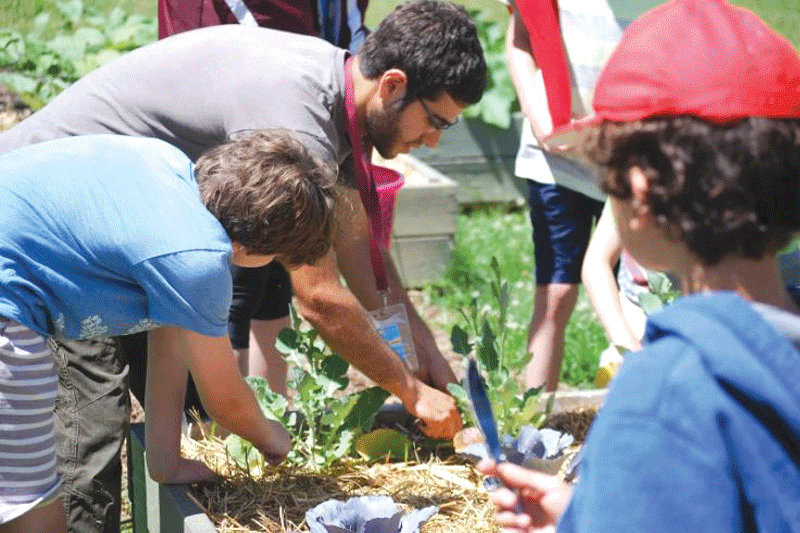The Sabes JCC’s new inclusive garden offers benefits for youth day campers, seniors and those with disabilities
By SAMANTHA EZRILOV
Greenery surrounded Makai Dorfman, Judaic and garden specialist at the Sabes JCC’s Camp Olami, as he enthusiastically walked through the garden that he helped create. He explained its unique qualities.
“It’s shaped like a menora,” Dorfman told the AJW on a recent visit to the garden. “Each branch represents a different day of creation.”
The Jewish attributes of the JCC’s new community garden, like its shape that can be seen fully from above, are less obvious than the efforts made by Dorfman and Sabes JCC Inclusion Director Anita Lewis to make it a place that everyone can access and enjoy.

Throughout the summer, kids from Camp Olami, seniors, adults with disabilities and other community members are planting, nurturing and harvesting the new and inclusive — and completely organic — garden.
Close proximity to the parking lot, raised beds for plants to grow and wide pathways ensure that the garden is a place where anyone — from wheelchair-bound seniors to pre-kindergarten children of all abilities — can find purpose and acceptance.
The JCC’s new community garden follows a previous garden that had been a part of the early childhood center. A local Jewish Boy Scout working towards becoming an Eagle Scout helped to expand the garden from a small area into a larger, more accommodating “outdoor classroom.”
“The garden is this place, and it’s safe and it’s enlivening and it’s changing children who oftentimes aren’t speaking, children who oftentimes don’t have anything in common with their peer group. Adults too,” Lewis said. “When they’re in that garden and they’re sharing that experience, it’s an inclusive, wonderful thing. It doesn’t happen just anywhere.”
The garden is a prized addition to the JCC’s inclusion-focused facilities.
“Our whole philosophy about inclusion at the JCC is that everyone has the right to belong, everybody has the right to have friends, everybody has the right to have the exact same experience and a sense of belonging and a sense of pride as anybody else,”said Soni Cohen, the JCC’s chief operating officer. “The garden is a perfect example of an idea that is sort of a no-brainer in terms of, Does it fit with what we’re doing [at the JCC]? Of course the garden is the way it is, we wouldn’t build it any other way.”
Dorfman is a recent graduate of the University of Minnesota, with a degree in landscaping and architecture. He participated in Adamah: The Jewish Environmental Fellowship, a Hazon-sponsored three-month leadership training program for young Jewish adults that integrates organic agriculture, farm-to-table living, Jewish learning, community building and spiritual practice.
At the Sabes JCC, Dorfman uses the garden to connect with his students in a way that is hands-on and engaging. He presents lessons about pollination, Judaism and Jewish traditions in the garden’s open middle area, which represents the seventh day of creation, the day of rest.
“The intention of the design was to create a large space in the middle of the garden that can serve to accommodate around 20 people or so,” Dorfman said. “To teach out of that space so that they’re then surrounded by things that are alive enhances learning that much more, and I can directly point to what I’m actually speaking about when I’m teaching.”

Dorfman has a lot of material to teach about, but one thing that he likes about the garden is the impact it can have on how kids view food. The majority of plant life found among the rows in the raised beds comes in the form of organic foods that visitors can taste as they garden.
Carrots, beets, strawberries, six types of tomatoes, spinach, kale and herbs of all kinds are only a few of the things that the campers and visitors grow. Some of the food is provided to seniors in the JCC’s communal dining program, and Dorfman estimated that about 80 to 90 percent is donated to local food shelves — illustrating the Jewish value of tzedaka.
“A big part of the intention is connecting children and families directly to their food and growing their own so that they can see and be a part of the process, and also know where it comes from and feel empowered to begin to do the same thing,” Dorfman said.
So far, the JCC garden has donated 33 pounds of fresh, organic food to food shelves in Minneapolis and St. Paul. Comparing the garden to a “giant tzedaka box,” Dorfman is proud of the impact that the garden has had on some of the younger participants.
“I had a camper come up to me the other day with a bag of herbs from his garden at home and he said to me ‘Makai, will you take this to the food shelf too because I want to give,’” Dorfman said. “So they’re starting to internalize these values and we’re beginning to see that.”
The garden also connects religious, health, cultural and environmental values, and shares them with the greater Minnesota community.
“You can’t really have Judaism without agriculture. They are so tied and linked together,” Dorfman said. “This is hopefully the seed that’s being planted, so to speak. To have visitors grow in understanding and learn how our culture and religion is so connected with the land and with the earth and how we are [connected] with each other.”
***
A photo exhibit highlighting the progress of the community garden will be on display beginning Aug. 18 in the lobby entrance of the fitness center at the Sabes JCC, 4330 Cedar Lake Rd. S., St. Louis Park. For information, visit: www.sabesjcc.org.
Samantha Ezrilov is an editorial intern at the American Jewish World.



















